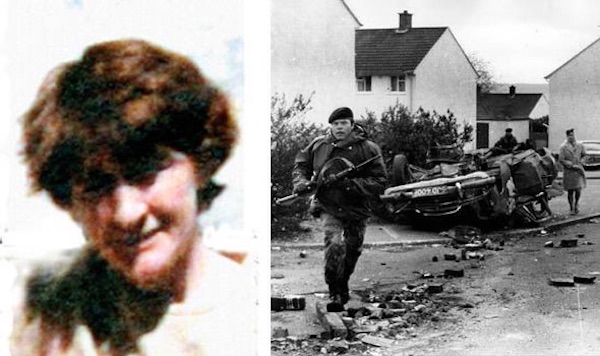
A former member of the British Army’s Parachute Regiment has admitted that anyone on the streets of Ballymurphy in west Belfast during the introduction of internment was considered to be associated with the IRA and liable to be shot.
An inquest into the Ballymurphy massacre is taking place at Belfast Coroner’s Court. It is examining the murders of ten civilians, including a mother of eight, over the space of 36 hours.
Soldiers “revelled” in what had happened and congratulated each other after the killings, the witness, known as M597, said. He said some of the Paras deployed to control the area were “psychopaths” who had only joined up in order to avoid a prison sentence.
“Rogue soldiers were out of control, killing people on the street and knowing that they would be protected,” he said. “They were saying, anything out there that moves, we consider them to be in the IRA or associated with the IRA, and for that alone they could be or should be shot.”
Earlier, he explained that on 9 August 1971, he had shot and wounded a rioter on the Falls Road in west Belfast and had accompanied him to hospital. He said the incident was not properly investigated, but that the battalion adjutant had called him into his office some days later and given him “literally a pat on the back”.
He said the officer had told him “the only mistake you made was not killing the f*ckers”. Other soldiers told him how lucky he was to have a “notch on my rifle”.
He also recalled a conversation between soldiers in Belfast which took place with three or four bodies lying nearby. He was told that officers in charge of B Company had “lost control”, that the Paras were of the opinion that anyone, regardless of sex or age, should be shot.
They had no feeling or respect for the dead. “It was a joke, literally it could be for anything, not four human beings, it could be four anything.” He added: “They seemed to think they could do anything and get away with it.”
He could not recall any briefing or debriefing after the killings. “They were on a high and enjoying it, soldiers do enjoy going to battle as opposed to doing nothing. Those soldiers were enjoying it and could not wait to get back out again.”
He said the Parachute Regiment is no different today than it was 50 years ago and referred to recent Facebook postings with instructions for ex-soldiers about how to avoid being held accountable for war crimes. “Death, dementia and delay,” he said. “What they are saying is delay it, delay it and we will all be gone.”
He broke down in the witness box and described a continuing culture within the military of covering up killings. “It is like the KKK, it is like a brotherhood, they are sticking together,” he said.
He told the inquest that some soldiers were from broken homes, and had evaded going to prison if they joined the British army. “There were also psychopaths in there, there were people who were dangerous to have around.”
BLED TO DEATH
The inquest also heard that a victim might have lived if she had received treatment. Joan Connolly (pictured), a 44-year-old mother of eight, was one of a group of four fatally shot while sheltering in a field.
Mrs Connolly was shot up to three times by high-velocity bullets with two serious wounds, one to her face and one to her thigh. There was a third injury to her hand.
Mrs Connolly’s body was brought to the British Army base after it had been left lying on the waste ground. The court heard that she would have been conscious and possibly able to cry out for some time after her wounds were sustained. The experts agreed that she would have ultimately bled to death.
Dr Benjamin Swift was asked if it was possible she might have survived her wounds if she had received early medical treatment. “I believe so, yes,” he said.
![[Irish Republican News]](https://republican-news.org/graphics/title_gifs/rn.gif)
![[Irish Republican News]](https://republican-news.org/graphics/title_gifs/harp.gif)

